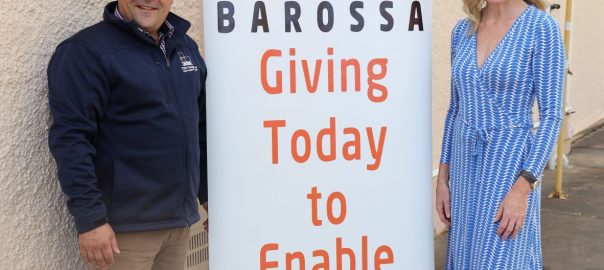
Member for Barker Tony Pasin MP has celebrated another Budget win for the Barossa community this week with Barossa Foundation to benefit from reforms that will give the organisation greater ability to raise and distribute funding.
Mr Pasin has been championing changes to the Deductable Gift Recipient rules amongst Government Ministers in Canberra and has welcomed the reforms included in the Budget this week.
“I’ve been fighting for these changes for some time and I’m thrilled to be able to see this through. The benefits of these reforms will be seen throughout the Barossa via the amazing work that Barossa Foundation does for our community,” Mr Pasin said.
The Budget announced that up to 28 community foundations, including Barossa Foundation, would receive a specific listing as Deductible Gift Recipients from 1 July 2022 to 30 June 2027.
This important reform will streamline how community foundations fund local charitable groups and initiatives in their communities.
Until now DGR rules have meant that community foundations can only receive tax deductible donations if they set up a ‘Public Ancillary Fund’, known as an ‘Item 2 DGR’. This restricts how they distribute funding, which can only be granted to charities that are ‘Item 1 DGR’ endorsed.
The reforms will also allow Private Ancillary Funds (PAFs – private foundations set up by individuals, families or businesses) to distribute funds to community foundations – up until now community foundations have been cut off from this growing flow of private philanthropy. Philanthropy Australia has heard from a number of members that they want to use their PAF to donate to community foundations, especially in emergencies, and this significant announcement will allow that to happen.
“This reform will simplify the work of community foundations, enabling faster responses to community need and greater impact,” Mr Pasin said.
“PAFs distribute over $500 million in any given year. These reforms give community foundations access to this pool of funding giving organisations like Barossa Foundation, and in turn our local Barossa communities, a very welcome funding boost” Mr Pasin said.
These reforms make it easier for listed community foundations, like Barossa Foundation, to support local charitable activities, making donor dollars go further faster. Until now, community foundations have only been able fund ‘Item 1’ Deductible Gift-Recipient (DGR) charities. There are few charities with this status in regional areas, which meant that community foundations could not fund many grassroots community groups and initiatives. Under these reforms, specifically listed community foundations will now be able to fund any charitable activities carried out by groups and organisations, provided those activities are covered by one of the 52 existing DGR endorsement categories and are consistent with the community foundations own purposes and rules.
It enables Barossa Foundation `to accept donations from PAFs and other ancillary funds. Until now they were not able to provide support to any other type of ancillary fund, including community foundations that operate as Public Ancillary Funds (PuAF).
Barossa Foundation Chairperson Neil Retallick expressed his gratitude to Mr Pasin, acknowledging his persistent support for this important change.
“The reduced administrative burden combined with the increased agility of our Foundation will provide substantial and ongoing benefits our community. In this, Mr Pasin has been a true champion for those of us that need a helping hand.” Mr Retallick said.
ENDS.








